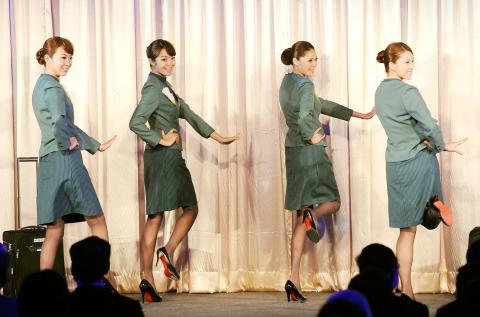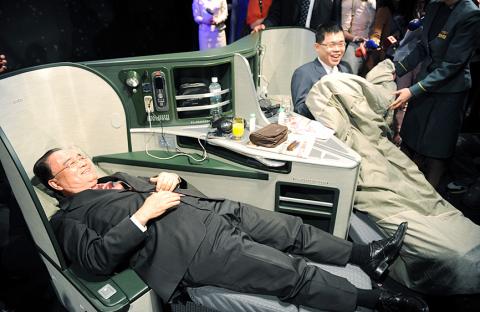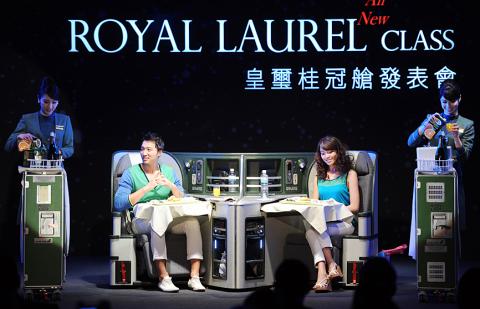EVA Airways Corp (EVA, 長榮航空) yesterday announced plans to spend US$100 million to upgrade the business class on its 15 Boeing 777-300ER aircraft, in the hope that a focus on premium customers will help to increase revenue.
EVA, the nation’s second-largest carrier, will complete the upgrade by August next year, with first plane to be finished by the end of this month set to start operating on the Taipei-New York route from June 2.
“Faced with tougher economy-class service competition, the company is looking to attract more premium customers through the upgrade,” EVA president Chang Kuo-wei (張國煒) told a media briefing.

Photo: Lo Pei-der, Taipei Times
Chang said the rise of budget airlines had made it increasingly difficult for carriers to focus solely on economy class, which was why EVA had decided to follow Cathay Pacific Airways and Singapore Airlines by targeting business-class customers.
To achieve this goal, EVA would reduce the number of business-class seats, but could increase the price by up to 20 percent, further helping increase company revenue, Chang said.
While market observers remain downbeat about the prospects of the airline sector this year, Chang said it was always good to invest more when economic sentiment was close to the bottom because of lower costs.

Photo: Lo Pei-der, Taipei Times
Meanwhile, Chang said he expected the company’s revenue to improve in the second quarter from the first quarter on the back of higher cargo sales led by stable freight rate and volume.
However, the carrier’s performance during the July-to--September period, the peak season for passenger demand, would remain the most important driver for the company this year, he added
In addition, rising crude oil prices continue to increase cost pressure and affect the company’s profitability, he said.

Photo: Lo Pei-der, Taipei Times
“Actually, we are likely to improve our sales performance this year,” Chang said. “The only downside is that all our hard work is -going to benefit the oil companies.”
However, EVA had no plans to buy an oil refiner like Delta Air Lines Inc did, as the company does not have the necessary expertise to run an oil refining -company, Chang said.
EVA reported NT$1.08 billion (US$36.9 million), or NT$0.33 per share, in net losses for the first quarter of the year, compared with profits of NT$269.32 million, or NT$0.08 per share, a year earlier, Taiwan Stock Exchange (TWSE) data showed.
However, revenue for the company totaled NT$25.57 billion in the January-to-March period, up 5.7 percent from the previous year, statistics showed.
EVA’s shares fell 0.28 percent to close at NT$17.95 on the TAIEX yesterday, stock exchange data showed.

Taiwan Semiconductor Manufacturing Co (TSMC, 台積電) last week recorded an increase in the number of shareholders to the highest in almost eight months, despite its share price falling 3.38 percent from the previous week, Taiwan Stock Exchange data released on Saturday showed. As of Friday, TSMC had 1.88 million shareholders, the most since the week of April 25 and an increase of 31,870 from the previous week, the data showed. The number of shareholders jumped despite a drop of NT$50 (US$1.59), or 3.38 percent, in TSMC’s share price from a week earlier to NT$1,430, as investors took profits from their earlier gains

In a high-security Shenzhen laboratory, Chinese scientists have built what Washington has spent years trying to prevent: a prototype of a machine capable of producing the cutting-edge semiconductor chips that power artificial intelligence (AI), smartphones and weapons central to Western military dominance, Reuters has learned. Completed early this year and undergoing testing, the prototype fills nearly an entire factory floor. It was built by a team of former engineers from Dutch semiconductor giant ASML who reverse-engineered the company’s extreme ultraviolet lithography (EUV) machines, according to two people with knowledge of the project. EUV machines sit at the heart of a technological Cold

TAIWAN VALUE CHAIN: Foxtron is to fully own Luxgen following the transaction and it plans to launch a new electric model, the Foxtron Bria, in Taiwan next year Yulon Motor Co (裕隆汽車) yesterday said that its board of directors approved the disposal of its electric vehicle (EV) unit, Luxgen Motor Co (納智捷汽車), to Foxtron Vehicle Technologies Co (鴻華先進) for NT$787.6 million (US$24.98 million). Foxtron, a half-half joint venture between Yulon affiliate Hua-Chuang Automobile Information Technical Center Co (華創車電) and Hon Hai Precision Industry Co (鴻海精密), expects to wrap up the deal in the first quarter of next year. Foxtron would fully own Luxgen following the transaction, including five car distributing companies, outlets and all employees. The deal is subject to the approval of the Fair Trade Commission, Foxtron said. “Foxtron will be

INFLATION CONSIDERATION: The BOJ governor said that it would ‘keep making appropriate decisions’ and would adjust depending on the economy and prices The Bank of Japan (BOJ) yesterday raised its benchmark interest rate to the highest in 30 years and said more increases are in the pipeline if conditions allow, in a sign of growing conviction that it can attain the stable inflation target it has pursued for more than a decade. Bank of Japan Governor Kazuo Ueda’s policy board increased the rate by 0.2 percentage points to 0.75 percent, in a unanimous decision, the bank said in a statement. The central bank cited the rising likelihood of its economic outlook being realized. The rate change was expected by all 50 economists surveyed by Bloomberg. The